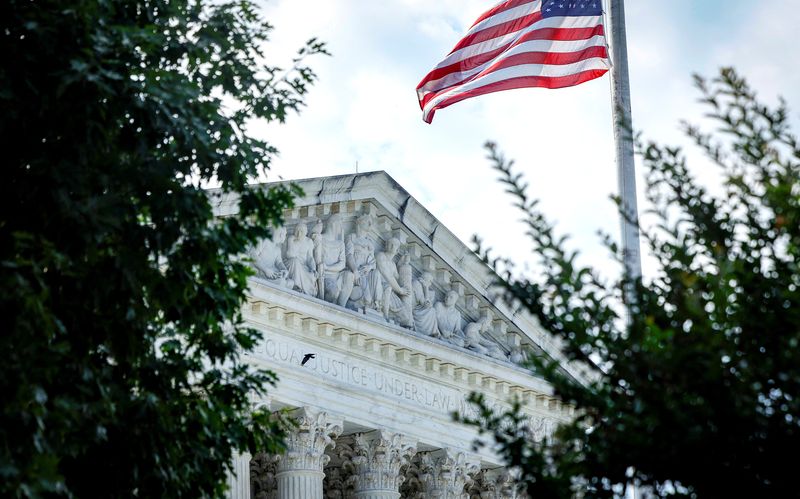By John Kruzel and Andrew Chung
WASHINGTON (Reuters) -The U.S. Supreme Court on Tuesday appeared ready to side with a challenge on free speech grounds to a Colorado law banning psychotherapists from conducting “conversion therapy” that aims to change a minor’s sexual orientation or gender identity.
Questions posed by the court’s conservative justices during arguments in the case signaled their sympathy toward Christian licensed counselor Kaley Chiles, who challenged the law under the U.S. Constitution’s First Amendment protections against government abridgment of free speech. The court has a 6-3 conservative majority.
Some of the liberal justices during the arguments seemed persuaded that Colorado has the authority to forbid a healthcare practice it considers unsafe and ineffective.
Chiles appealed a lower court’s decision rejecting her claim that the 2019 statute unlawfully censors her communications with clients.
Colorado Solicitor General Shannon Stevenson told the justices that the law regulates conduct, not speech. States should not lose their longstanding power to regulate safety in healthcare and to restrict the use by providers of harmful treatments that violate a profession’s standard of care “just because they are using words,” Stevenson argued.
Conservative Chief Justice John Roberts pushed back on Stevenson’s assertion, saying that the court’s precedents make clear that “just because they’re engaged in conduct doesn’t mean that their words aren’t protected.”
Colorado’s law prohibits licensed mental healthcare providers from seeking to change a minor’s sexual orientation or gender identity according to a predetermined outcome, with each violation punishable by a fine of up to $5,000. This includes attempts to reduce or eliminate same-sex attraction or change “behaviors or gender expressions.”
The law does permit treatments that provide “assistance to a person undergoing gender transition,” as well as therapies centered on “acceptance, support and understanding” for “identity exploration and development.”
Conservative Justice Samuel Alito seemed to embrace the plaintiff’s claim that Colorado’s law aims to marginalize views the state dislikes, saying the measure appears to allow therapists to help a patient feel comfortable about being gay but bars them from helping a patient who seeks to “end or lessen” their same-sex attraction.
“It seems to me your statute dictates opposite results in those two situations” based on the viewpoint expressed, Alito told Stevenson.
“Looks like blatant viewpoint discrimination,” Alito added.
Democratic Colorado Governor Jared Polis, the first openly gay man to be elected as a U.S. state governor and a critic of conversion therapy, signed the measure into law in 2019. Republican President Donald Trump’s administration is backing Chiles in the dispute.
James Campbell, a lawyer for Chiles, told the justices that Colorado’s law “forbids counselors like Kaley Chiles from helping minors pursue state-disfavored goals on issues of gender and sexuality.”
“This law prophylactically bans voluntary conversations, censoring widely held views on debated moral, religious and scientific questions,” Campbell said.
Colorado is among more than two dozen states and the District of Columbia that restrict or prohibit conversion therapy for patients younger than 18.
Colorado has cited the state’s interest in ensuring that minors receive safe and effective mental healthcare, saying states routinely regulate healthcare practices, including talk therapy, to guard against “substandard” care.
Stevenson told the justices, “People have been trying to do conversion therapy for a hundred years, with no record of success. There is no study, despite the fact that people tried to advance this practice, that has ever shown that it has any chance of being efficacious.”
Medical groups such as the American Psychological Association cite studies showing that the practice has been associated with harms including an increased likelihood of transgender minors running away from home or attempting suicide.
‘IRREPARABLE HARM’
Campbell and Justice Department lawyer Hashim Mooppan said the Colorado law should be assessed under the most stringent form of judicial review, known as strict scrutiny, rather than the lesser review applied by the lower courts. Some of the justices asked the attorneys about the possibility of the Supreme Court sending the case back to a lower court to apply that heightened level of legal scrutiny to the measure.
Liberal Justice Ketanji Brown Jackson said applying strict scrutiny would not necessarily doom the law.
“So why wouldn’t we give the lower courts a chance to evaluate whether there’s sufficient evidence here for the state to actually go forward with this regulation?” Jackson asked.
Campbell objected to that approach, saying “there is irreparable harm going on right now.” Campbell said Chiles “is being silenced. The kids and the families who want this kind of help that she’ll offer are being left without any support.”
The case gives the court’s conservative majority another opportunity to elevate the interests of a conservative Christian litigant at the expense of protections for LGBT people. Chiles has said she “believes that people flourish when they live consistently with God’s design, including their biological sex.”
Chiles is represented by the Alliance Defending Freedom, a conservative religious rights group that has secured high-profile Supreme Court victories on behalf of a baker and wedding website designer who refused, based on their Christian beliefs, to serve gay couples.
The Supreme Court’s ruling is expected by the end of June.
(Reporting by John Kruzel; Additional reporting by Andrew Chung; Editing by Will Dunham)

